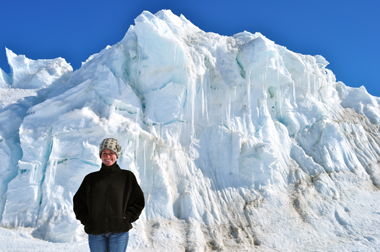Winter Break in Antarctica
Jan. 9, 2012 -- Some college students fly South over the winter break. University at Albany graduate student Lynsey Cross kept going -- all the way to Antarctica and the South Pole.Cross, a second-year student in UAlbany’s Master of Public Health Program, is in Antarctica for five weeks on an 11,000-mile journey with the 109th Stratton Air National Guard Base of Scotia, N.Y., and the National Science Foundation (NSF).
 |
|
UAlbany School of Public Health student Lynsey Cross is in Antarctica over winter break as part of her duties with the 109th Stratton Air National Guard Base of Scotia, N.Y. |
“We are the only base in the U.S. with C-130s that have skis, making it feasible to land on ice and snow,” said Staff Sergeant Cross, of Hudson Falls, N.Y. “We have a very unique mission - to fly and support the NSF in Antarctica, and fly to Greenland for training purposes.”
The specialized planes take scientists and support teams to camps across the continent and fly sustainment materials to the South Pole.
While her time in Antarctica is not specifically related to her field of public health, Cross said her time at UAlbany’s School of Public Health has made her more aware of the impact humans have on the environment.
“For example, not much is just thrown out here,” she wrote in an e-mail from Antarctica. “We obviously have to take out everything that we bring in and/or use.”
During her visit, Cross is learning a great deal about how scientists measure the impact of global warming. With much speculation about the effects of thinning ice, scientists are searching for evidence to support this.
Various camps are also studying an array of environmental topics, including the species found in Antarctica. There are no trees, bugs, rodents, and very few "animals" living on the continent with the exception of the Skua-bird, penguins, and seals.
Scientists are intrigued by the "lake" that exists between the ice layers. There are organisms living under the ice in the ocean and between the ice layers. There is controversy surrounding what country has the authority to drill into this lake, and the potential effects of doing so. However, drilling will allow scientists to find and study the life forms that are living in the lake.
Cross has also taken advantage of her spare time on the five-week trip. She has snowboarded, had her photo taken with Adelie penguins, and toured Scott’s Hut, a 100-year-old hut with everything inside -- including food and a dead seal -- well preserved over the years by the freezing temperatures.
With her concentration in health policy and management, Cross’s long-term goal is to work with a consulting agency, a local health department, or in an administrative position.
![]() For more news, subscribe to UAlbany's RSS headline feeds
For more news, subscribe to UAlbany's RSS headline feeds
A comprehensive public research university, the University at Albany-SUNY offers more than 120 undergraduate majors and minors and 125 master's, doctoral and graduate certificate programs. UAlbany is a leader among all New York State colleges and universities in such diverse fields as atmospheric and environmental sciences, business, education, public health,health sciences, criminal justice, emergency preparedness, engineering and applied sciences, informatics, public administration, social welfare and sociology, taught by an extensive roster of faculty experts. It also offers expanded academic and research opportunities for students through an affiliation with Albany Law School. With a curriculum enhanced by 600 study-abroad opportunities, UAlbany launches great careers.


